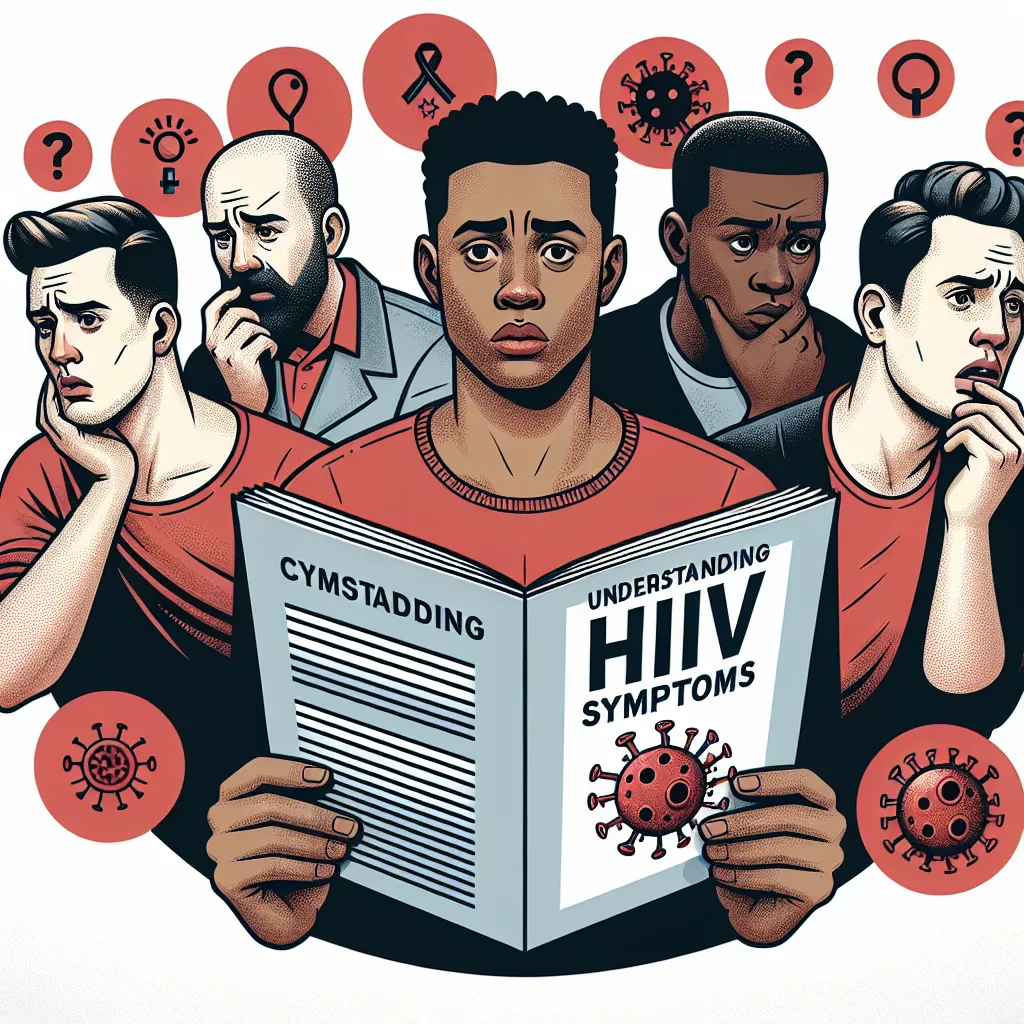HIV Symptoms in Men
HIV Symptoms in Men
HIV (Human Immunodeficiency Virus) is a virus that attacks the immune system, weakening it and making the body susceptible to various infections and diseases. While both men and women can contract HIV, the symptoms and effects can differ between the genders. In this article, we will focus on the symptoms of HIV in men.
Early Symptoms of HIV in Men
It is important to note that HIV symptoms can vary from person to person, and not everyone may experience the same symptoms. In some cases, individuals may not show any symptoms for several years after contracting the virus. However, early symptoms of HIV in men may include:
-
Fever:
Men infected with HIV may experience recurrent or persistent fever, usually higher than 100.4°F (38°C). -
Flu-like symptoms:
These may include sore throat, fatigue, swollen lymph nodes, body aches, and headaches. These symptoms can be mistaken for a common flu or viral infection. -
Rash:
Some men may develop a rash on their skin, often appearing as small red bumps or as a flat, discolored patch. -
Night sweats:
Excessive sweating, particularly during sleep, is another common symptom experienced by individuals with HIV. -
Weight loss:
Unexplained weight loss is often associated with HIV infection. This weight loss can occur even without changes in diet or physical activity.
Advanced Symptoms of HIV in Men
If left untreated, HIV can progress to a more advanced stage, known as AIDS (Acquired Immunodeficiency Syndrome). At this stage, the immune system is severely damaged, leading to a wide range of symptoms and opportunistic infections. Some advanced symptoms of HIV in men include:
-
Chronic diarrhea:
Persistent diarrhea that lasts for weeks or months is a common symptom of advanced HIV infection. -
Recurrent infections:
Men with HIV may experience frequent or severe infections, including pneumonia, tuberculosis, and fungal infections. -
Oral thrush:
This is a fungal infection that causes white patches to develop in the mouth or throat, making it difficult to swallow. -
Neurological symptoms:
HIV can affect the central nervous system, leading to symptoms such as memory loss, confusion, and difficulty concentrating. -
Opportunistic infections:
As the immune system weakens, individuals with advanced HIV are more susceptible to various opportunistic infections, including certain types of cancers. -
Extreme fatigue:
Persistent and unexplained fatigue is a common symptom experienced by individuals with advanced HIV infection.
When to Seek Medical Attention
If you suspect that you may have been exposed to HIV or are experiencing any of the symptoms mentioned above, it is crucial to seek medical attention as soon as possible. Early detection and treatment can significantly improve the prognosis and quality of life for individuals living with HIV.
A healthcare professional will perform specific tests, such as blood tests, to determine if you have been infected with HIV. It is important to remember that HIV symptoms alone are not a reliable indicator of infection, as they can be similar to symptoms of other common illnesses.

Preventing HIV Transmission
While there is no cure for HIV, it is preventable. Here are some essential steps to reduce the risk of HIV transmission:
-
Practice safe sex:
Always use condoms during sexual intercourse, especially with new or multiple partners. Regularly getting tested for sexually transmitted infections (STIs) is also crucial. -
Use clean needles:
If you inject drugs, always use sterile needles and never share them with others. -
Get tested regularly:
Knowing your HIV status is important for both your health and the health of your sexual partners. Regular testing can help detect the virus early and ensure timely treatment. -
Consider PrEP:
Pre-exposure prophylaxis (PrEP) is a medication that can significantly reduce the risk of contracting HIV when taken consistently by individuals at high risk.
Conclusion
Recognizing the symptoms of HIV in men is crucial for early detection and prompt treatment. If you experience any of the mentioned symptoms or suspect that you may have been exposed to HIV, it is essential to consult a healthcare professional and get tested. Remember, prevention through safe sex practices and regular testing is key in reducing the transmission of HIV.
